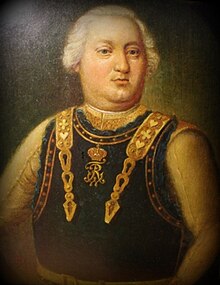|
Wilhelm Dietrich von Buddenbrock
 Wilhelm Dietrich Freiherr von Buddenbrock (15 March 1672 – 28 March 1757) was a Prussian Generalfeldmarschall and cavalry leader. BiographyBuddenbrock was born on 15 March 1672 to Elisabeth Sophia von Rappe and Johann von Buddenbrock in Tilsemischken (now Nemansky District) near Ragnit in the Duchy of Prussia. His family, Westphalian in origin, had settled in the Livonian Confederation in 1318 and in Ducal Prussia in 1622. After studying at the Albertina University of Königsberg for three years, Buddenbrock enlisted in the Prussian Army and campaigned in the Netherlands in 1690. As an 18-year-old cornet in an Anhalt cuirassier regiment, Buddenbrock fought in the Battle of Fleurus. His regiment participated in the major battles of the War of the Spanish Succession, and Buddenbrock was regimental commander at Malplaquet in 1709. He was promoted to Oberst of the 1st Prussian Cuirassier Regiment on 18 July 1724. Buddenbrock was accepted into King Frederick William I of Prussia's retinue in 1729, and was awarded the Order of the Black Eagle in 1739. A member of the so-called "Tobacco Ministry" (Tabakskollegium), Buddenbrock was one of Frederick William's companions when the king was on his deathbed. In recognition of his leadership in the 1742 Battle of Chotusitz, King Frederick II of Prussia awarded Buddenbrock a diamond-covered portrait of the monarch; the only other recipients of the medallion were Friedrich Wilhelm von Dossow and Hans von Lehwaldt. Frederick also granted Buddenbrock a district captaincy and a pay increment. On 19 March 1745, Buddenbrock was promoted to Generalfeldmarschall. Buddenbrock died at the age of 85 while Governor of Breslau. Regarding personal names: Freiherr was a title before 1919, but now is regarded as part of the surname. It is translated as Baron. Before the August 1919 abolition of nobility as a legal class, titles preceded the full name when given (Graf Helmuth James von Moltke). Since 1919, these titles, along with any nobiliary prefix (von, zu, etc.), can be used, but are regarded as a dependent part of the surname, and thus come after any given names (Helmuth James Graf von Moltke). Titles and all dependent parts of surnames are ignored in alphabetical sorting. The feminine forms are Freifrau and Freiin. Children
References
External links |
||||||||||||
Portal di Ensiklopedia Dunia
